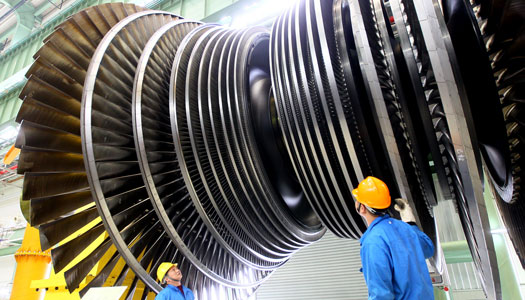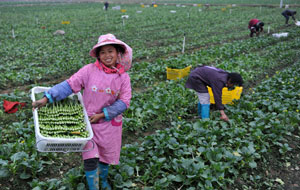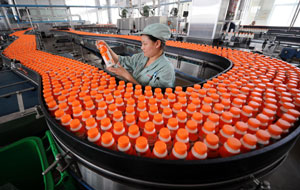

 As the end of the year is drawing near, Li Xuesong breathed a sigh of relief, for China's economy had finally bottomed out and began to rebound after a slowdown spanning seven seasons.
As the end of the year is drawing near, Li Xuesong breathed a sigh of relief, for China's economy had finally bottomed out and began to rebound after a slowdown spanning seven seasons.
It is still hard to say how long the rebound will last. At the conference analyzing and forecasting China's economy and the book launch for the Blue Book on China's Economy in 2013 held on Dec 5, Li, Deputy Director of the Institute of Quantitative and Technical Economics at the Chinese Academy of Social Sciences, suggested the foundation for economic recovery was still weak and uncertain. "It depends on international economic factors and domestic economic policies," said Li.
A stronger China and richer Chinese population could help to stimulate the lackluster global economy.
 When Chinese shoppers bring fortune to the struggling global economy, they deserve a merry shopping experience abroad.
When Chinese shoppers bring fortune to the struggling global economy, they deserve a merry shopping experience abroad.
Dozens of listed companies on the Chinese mainland reported receiving large government subsidies in the fourth quarter.
 Although China's inland areas are catching up in economic growth, they are warned not to blindly follow the coastal region's path.
Although China's inland areas are catching up in economic growth, they are warned not to blindly follow the coastal region's path.
 The manufacturing industry's demand for new employees shrunk by more than 20 percent year-on-year in the first three quarters of this year.
The manufacturing industry's demand for new employees shrunk by more than 20 percent year-on-year in the first three quarters of this year.
A global economic crisis usually nurtures a technological revolution and innovations can drive economic recovery.
Privately-owned companies in China rely on copying their counterparts' technology with few bothering to improve and innovate.
A lot of high-net-worth individuals in China are not satisfied with private banking services and look forward to tailor-made, innovative offerings.
Revenues from China's private banking sector are expected to grow from 23.3 billion yuan in 2010 to 46.8 billion yuan by 2015.
 "Christmas is coming and the geese are getting fat. Please put a penny in the old man's hat." It's the opening two lines of a traditional Christmas ditty but in this instance it is symbolic of what's happening in the world: The old man is China and what he needs is more domestic consumption.
"Christmas is coming and the geese are getting fat. Please put a penny in the old man's hat." It's the opening two lines of a traditional Christmas ditty but in this instance it is symbolic of what's happening in the world: The old man is China and what he needs is more domestic consumption.
The good news at a time of year that celebrates the birth of Christ, also known as Jesus and the Messiah, is that China has latched on to this festive season as yet another way of luring customers into shops and opening wallets and purses.
 The internationalization of the renminbi requires a look at distant horizons as well as the local market.
The internationalization of the renminbi requires a look at distant horizons as well as the local market.